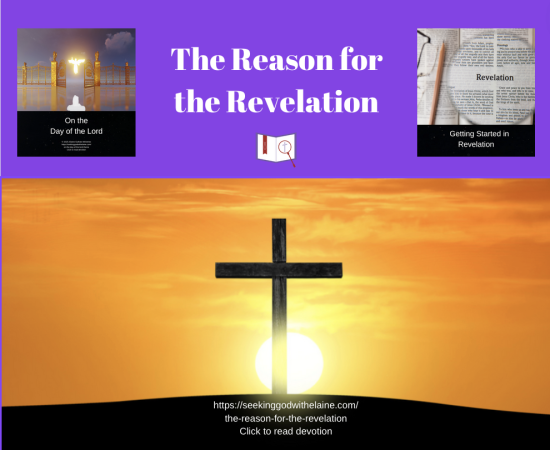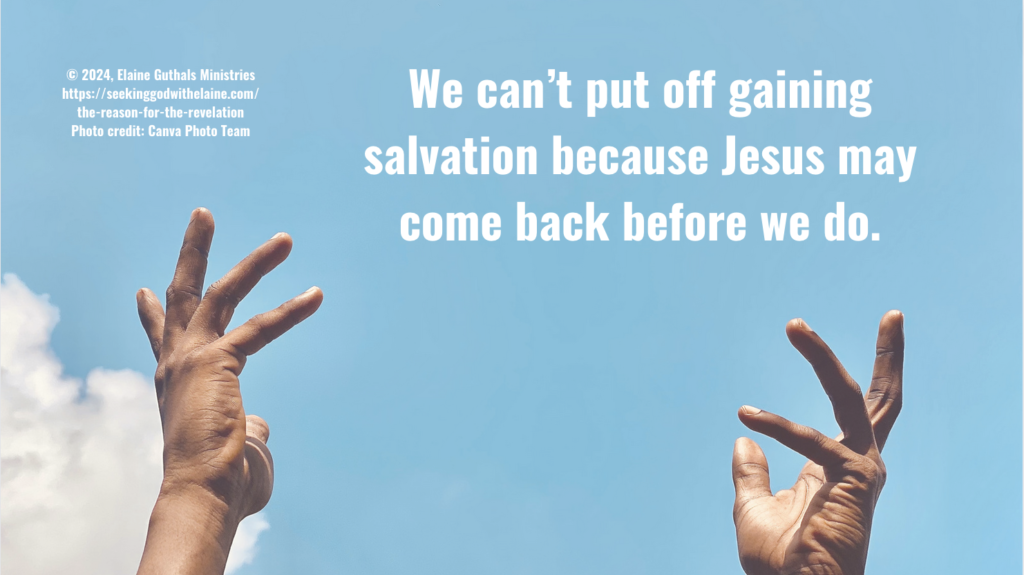God had a specific reason for giving John the message of prophecy. This devotional reading looks at how John was to be an eyewitness to the revelation given to the angel so that we may be blessed.
Nuggets
- The Book of Revelation was given by the angel to the Apostle John.
- John was to be an eyewitness to the revelation of God.
- We are blessed when we heed the prophecy given.

God and Jesus had a specific purpose for sending John the message that became the Book of Revelation.
Let's Put It into Context
To read devotions in the On the Day of the Lord theme, click the button below.
Devotions in the Getting Started in Revelation study
Related Links
We the People
Sent to John
“... He made it known by sending his angel to his servant John” (Rev. 1: 1 ESV)
The Book of Revelation was given by the angel to the Apostle John.
John was one of Jesus’s disciples. In fact, he is always listed as one of the first disciples called. Peter, Andrew, James, and John were called together (Mt. 4: 18-22).
That calling came while John was going about his daily business as a fisherman. “And going on a little farther, he saw James the son of Zebedee and John his brother, who were in their boat mending the nets. And immediately he called them, and they left their father Zebedee in the boat with the hired servants and followed him” (Mk. 1: 19-20 ESV).
Along with Peter and his brother James, John was in Jesus’ inner circle. He got to experience and witness things other disciples didn’t.
- “While Jesus was saying this, some messengers came from Jairus’ house and told him, ‘Your daughter has died. Why bother the Teacher any longer?’ Jesus paid no attention to what they said, but told him, ‘Don’t be afraid, only believe.’ Then he did not let anyone else go on with him except Peter and James and his brother John” (Mk. 5: 35-37 ESV).
- “And after six days Jesus took with him Peter and James, and John his brother, and led them up a high mountain by themselves. And he was transfigured before them, and his face shone like the sun, and his clothes became white as light” (Mt. 17: 1-2 ESV).
- “Then Jesus went with them to a place called Gethsemane, and he said to his disciples, ‘Sit here, while I go over there and pray.’ And taking with him Peter and the two sons of Zebedee, he began to be sorrowful and troubled” (Mt. 26: 36-37 ESV).
John is the self-described disciple whom Jesus loved. “One of his disciples, whom Jesus loved, was reclining at table at Jesus’ side, so Simon Peter motioned to him to ask Jesus of whom he was speaking” (Jn. 13: 23-24 ESV).
Well. John had been given a place of honor at the last supper. But there were some things he had to work on. He was called one of the Sons of Thunder (Mk. 3: 17).
John was the only disciple who was not put to death. Because of this, he was the last of Jesus’ disciples to die.
Some might trip over John being called Jesus’ servant. John obviously had no qualms about being called a servant.
Yes, Jesus called John to be a disciple that day by the boat. But John had to decide to follow that call. He had to voluntarily leave his father and follow Jesus.
Being a servant of Jesus is not a derogatory remark. He was the servant of the Servant of the Lord – the Messiah. “Behold my servant, whom I uphold, my chosen, in whom my soul delights; I have put my Spirit upon him; he will bring forth justice to the nations” (Isa. 42: 1 ESV).
John would have welcomed that title!
Bearing Witness to the Word of God
“who bore witness to the word of God and to the testimony of Jesus Christ, even to all that he saw” (Rev. 1: 2 ESV)
John was to be an eyewitness to the revelation of God.
John bore witness to Who Jesus was. He had spent three years of his life traveling with Him and spent the rest of his life telling others Who He was.
This book that John wrote is a testimony to what he was shown. It is an eyewitness account of the visions given to him by God the Father.
We are shown Who God is all throughout His Word – and Jesus is the Word (Jn. 1: 1). We need to read all of it to get a clear picture of Who He is.
That being said, God’s Word is just an introduction, but it isn’t all. God loves to reveal things to us. “For the Lord God does nothing without revealing his secret to his servants the prophets” (Amos 3: 7 ESV).
God wants us to know Who He is and what He is going to do.

We are also given the testimony of Jesus. He is the subject and object of the Book of Revelation.
Blessing the Readers
“Blessed is the one who reads aloud the words of this prophecy, and blessed are those who hear, and who keep what is written in it, for the time is near” (Rev. 1: 3 ESV)
We are blessed when we heed the prophecy given.
Verse 3 is the first of seven benedictions in the Book of Revelation. It blesses the readers of the book.
Ooo, baby. Do we ever need blessings to make it through the book!
John would have thought the blessing was based on the shema. “You shall love the LORD your God with all your heart and with all your soul and with all your might” (Deut. 6: 5 ESV).
We probably would, too, as it is the greatest commandment – with the addition of loving God with our mind.
Glossary
The blessing is based on three steps. We have to read, hear, and keep what is written in it (Rev. 1: 3 ESV). We have to be obedient. The blessing is conditional.
It says read aloud. Reading it aloud does help us understand it at times. If you are like me, there can be times I skip over words when I read it. Saying it aloud makes me slow down and look more closely at what is being said.
We can’t look at this book as only an accounting of a vision. Yes, John was charged to write down everything he saw. Yes, it was revealed to him in visions.
This revelation is more than that. It is prophecy. This is what the future holds. That is why it is also called the Apocalypse.

That future for some will be bright; for others, not so much. It is a revelation that details a cataclysmic ending.
We know the hear part. “How then will they call on him in whom they have not believed? And how are they to believe in him of whom they have never heard? And how are they to hear without someone preaching? And how are they to preach unless they are sent? As it is written, ‘How beautiful are the feet of those who preach the good news!’ But they have not all obeyed the gospel. For Isaiah says, ‘Lord, who has believed what he has heard from us?’ So faith comes from hearing, and hearing through the word of Christ” (Rom. 10: 14-17 ESV).
We join like-minded believers in a worship service to hear the Pastor Steve-types tell us the words God have given him to say.
Hey! Those are two ways in which we seek God!
Searching for and Seeking God
Hearing His Word (Rom. 10: 17)
Reading His Word (Rev. 1: 3)
Praying to Him (Heb. 4: 16)
Studying His Word (Ac. 17: 11)
Meditating on His Word (Ps. 1: 1-2)
Memorizing His Word (Ps. 119: 11)
But it doesn’t stop there. We have to keep them.
- “If you know these things, blessed are you if you do them” (Jn. 13: 17 ESV).
- “My son, be attentive to my words; incline your ear to my sayings. Let them not escape from your sight; keep them within your heart. For they are life to those who find them, and healing to all their flesh. Keep your heart with all vigilance, for from it flow the springs of life” (Prov. 4: 20-23 ESV).
- “If you keep my commandments, you will abide in my love, just as I have kept my Father’s commandments and abide in his love” (Jn. 15: 10 ESV).
- “And this is love, that we walk according to his commandments; this is the commandment, just as you have heard from the beginning, so that you should walk in it” (II Jn. 1: 6 ESV).
That is the focus of Revelation. We have to obey – not just keep but obey – God’s Word so that we can spend eternity with Him.
Young put this into perspective. He wrote, “To keep those things is to believe them. Faith must be mixed with the hearing of the gospel; we cannot keep those things unless we believe them.”
Resource
We have to believe what John wrote in the Book of Revelation. Yes, it is difficult to understand.
We need to take what God reveals to us and keep it. Some stuff, we will have to put in the UNR book – understanding not relevant.
We must say that all of it is God’s prophetic word. We will get a special blessing to read, hear, and keep the words in Revelation.
The Time is Near
Ooo, baby. We aren’t even off the third verse, and we’ve hit confusion already. Jesus told John that the end was near.
Hello! Two thousand years later, and we are still here!!!
John and Paul – and probably a lot of other people – thought Jesus’ return was going to happen any day.
Personally, I can see why it didn’t happen way back then. Even with John the only original Apostle still left, they would have completely missed the Jesus-the-religious-Savior focus of Jesus’ mission. They were so intent on Him being Jesus-the-military-savior.
As long as they were under the rule of Rome, the Jews were going to miss Who He was. Even after He died, they probably thought He was going to come riding in and save the nation. In their minds, He was probably both religious and military.
There was no way on God’s green earth that Jesus was coming back until their thinking got switched around.
Wouldn’t it have been a comfort to them, though? They were going through severe persecution, but Jesus was going to call them home soon.
How many times have we thought Jesus is coming soon because it can’t get any worse?
We shouldn’t fault them, though. They weren’t the only ones struggling to understand what the words really meant. There are different ways to interpret Revelation.
- Preterist – Revelation talks about past occurrences, such as the destruction of the temple in 70 AD or even the exile to Babylon. The problem with this viewpoint is that it is hard to connect it to historical events. Also, not all of the prophecies have been fulfilled yet – in fact, most. In their viewpoint, the Church has replaced Israel as God’s people.
- Historicist – Revelation is talking about the development of the church, giving rise to the belief that Christ would come at that time. The problem is still we’re still here.
- Futurist – Revelation is talking about things to come and should be taken literally and chronologically. That order is Israel’s restoration, rapture, tribulation, antichrist, Christ’s 1000-year rule, Armageddon, and eternity. That makes Revelation irrelevant to everyone except those living in the actual end times.
- Redemptive-Historical-Idealist – Revelation is symbolic rather than literal. It applies to the Church.
I see good and bad in all of these. Plus, I don’t think it matters what someone else thinks. We have to develop our own understanding based on God’s revelation to us. That way we can apply it to our own lives.
What we do have to have is the urgency that John, Paul, and the others of their day had. They thought Jesus was coming as early as today.
We have to be looking for Jesus’ return that soon, too.
Why? We need to be ready when it gets here. There are two parts to that.
We don’t know when Jesus will return. ““But concerning that day and hour no one knows, not even the angels of heaven, nor the Son, but the Father only” (Mat 24: 36 ESV).
We can’t put gaining salvation off because He may come back before we do.

The other part is we might not be here when Jesus returns. John thought Jesus was coming in his lifetime. He’s been long dead.
If John – or we – wait for any reason, we are taking our eternal life into our hands. We may not be glad we waited.
How Do We Apply This?
- Watch for apocalyptic events in our time so we don’t miss them.
- Follow the directions of the prophecy.
- Seek salvation today.
Resource
Father God. We want to know You as You are. Thank You for showing us the way to salvation. Thank You for showing us what will come. Amen.
What do you think?
Leave me a comment below (about this or anything else) or head over to my Facebook group for some interactive discussion.
If you don’t understand something and would like further clarification, please contact me.
If you have not signed up for the email providing the link to the devotions and the newsletter, do so below.
If God has used this devotion to speak with you, consider sharing it on social media.